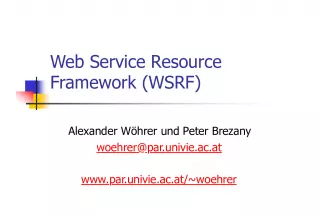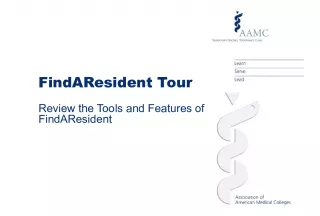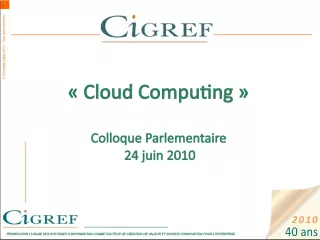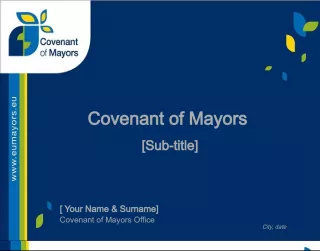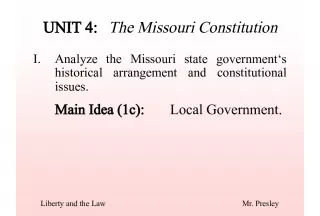Efficient Service Provision at Local Government Level in Zambia: Implications and Challenges for Decentralisation
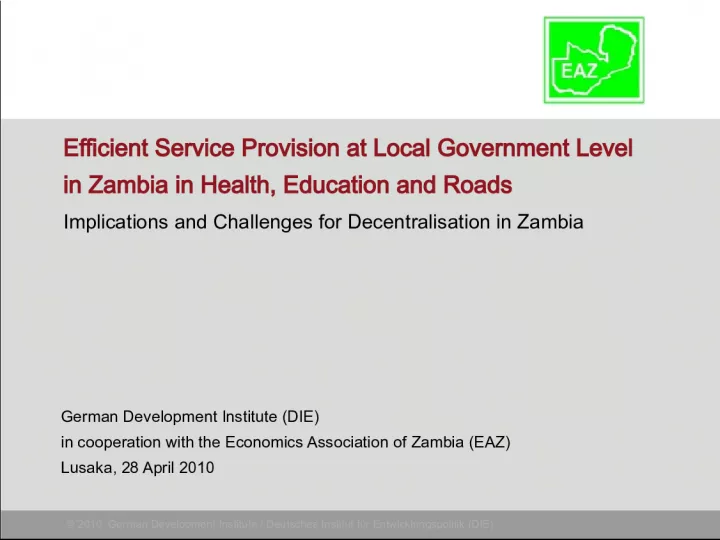

German Development Institute and Economics Association of Zambia presented research findings on efficient service delivery in health, education, and roads, analyzing the prospects of decentralization in Zambia and establishing sector working groups.
- Uploaded on | 0 Views
-
 delphine
delphine
About Efficient Service Provision at Local Government Level in Zambia: Implications and Challenges for Decentralisation
PowerPoint presentation about 'Efficient Service Provision at Local Government Level in Zambia: Implications and Challenges for Decentralisation'. This presentation describes the topic on German Development Institute and Economics Association of Zambia presented research findings on efficient service delivery in health, education, and roads, analyzing the prospects of decentralization in Zambia and establishing sector working groups.. The key topics included in this slideshow are . Download this presentation absolutely free.
Presentation Transcript
1. 2010 German Development Institute / Deutsches Institut fr Entwicklungspolitik (DIE) Efficient Service Provision at Local Government Level in Zambia in Health, Education and Roads Implications and Challenges for Decentralisation in Zambia German Development Institute (DIE) in cooperation with the Economics Association of Zambia (EAZ) Lusaka, 28 April 2010
2. 2010 German Development Institute / Deutsches Institut fr Entwicklungspolitik (DIE) 2 Outline 1. Introduction 2. Context 3. Research Aim 4. Conceptual Approach 5. Main Findings 5.1 Roads 5.2 Health 5.3 Education 6. Introduction to Sector Working Groups
3. 2010 German Development Institute / Deutsches Institut fr Entwicklungspolitik (DIE) 3 1. Introduction The German Development Institute (DIE) DIE is a multidisciplinary research, advisory and training institute for Germanys bilateral and multilateral development cooperation On the basis of independent research, DIE acts as an advisor to public institutions in Germany and abroad on current issues of development and cooperation between developed and developing countries
4. 2010 German Development Institute / Deutsches Institut fr Entwicklungspolitik (DIE) 4 2. Context
5. 2010 German Development Institute / Deutsches Institut fr Entwicklungspolitik (DIE) 5 3. Research Aim Aim of this research: 1. Identify constraints to efficient service delivery at local government level in rural roads, basic education and primary health care 2. Identify short-/medium term potential for improving the efficiency of public financial management (PFM) Methodology: Desk study of the sectors in Germany and Zambia and development of conceptual approach Zambia: Interviews with key stakeholders at central and provincial level; In-depth case studies of four districts in Central and Eastern Province
6. 2010 German Development Institute / Deutsches Institut fr Entwicklungspolitik (DIE) 6 4. Conceptual Approach Determinants Constraints Impact ? Capacity Coordination Commitment Control ... Efficiency Planning Implementation Control
7. 2010 German Development Institute / Deutsches Institut fr Entwicklungspolitik (DIE) 7 4. Conceptual Approach Determinants Constraints Impact ? Capacity Coordination Commitment Mobility I n e f f i c i e n c y
8. 2010 German Development Institute / Deutsches Institut fr Entwicklungspolitik (DIE) 8 4. Conceptual Approach Determinants Constraints Impact 1. Lack of Resources Capacity Coordination Commitment Mobility I n e f f i c i e n c y 2. Concentration of Control and Decision-Making
9. 2010 German Development Institute / Deutsches Institut fr Entwicklungspolitik (DIE) 9 4. Conceptual Approach Determinants Constraints Impact Lack of Resources Mobility Council is unable to supervise road works
10. 2010 German Development Institute / Deutsches Institut fr Entwicklungspolitik (DIE) 10 5. Main Findings 5.1 Rural Roads Maintenance 5.2 Basic Health Care 5.3 Basic Education
11. 2010 German Development Institute / Deutsches Institut fr Entwicklungspolitik (DIE) 11 5.1. Main Findings Rural Roads Maintenance Main challenges affecting efficient service provision in rural roads maintenance - Fragmented funding flows: affect the efficient use of the Constituency Development Fund - Difficult small-scale contractor engagement: affects the efficient implementation of rural road maintenance - Different Planning Processes of RDA and RRU: affect efficient planning of rural roads
12. 2010 German Development Institute / Deutsches Institut fr Entwicklungspolitik (DIE) 12 5.2. Main Findings Basic Health Care Main challenges affecting efficient service provision in the health sector : - Human Resource Crisis : affects planning, implementation and control - Inflexible Drug Delivery System : drug stock-outs and overflows - Lack of Flexibility : impedes staff initiative in planning and budgeting - Lack of Mobility : affects drug distribution, supervisory visits etc. - Erratic/Unpredictable Funding: affects efficiency in planning, implementation and control
13. 2010 German Development Institute / Deutsches Institut fr Entwicklungspolitik (DIE) 13 5.3. Main Findings Basic Education Generally, PFM in the basic education sub-sector seems to be working well Main challenges affecting efficient service provision in the education sector: - Erratic/Unpredictable Funding: affects efficiency in planning, implementation and control - Lack of Mobility : hinders education officers to carry out their tasks - Lack of Flexibility : affects schools in their budgeting prioritisations - Community Mode Construction : is affected by resistance in certain communities
14. 2010 German Development Institute / Deutsches Institut fr Entwicklungspolitik (DIE) 14 6. Introduction to Sector Working Groups Sector working groups: First part: discussion of selected findings and possible technical solutions Second part: discussion of implications and challenges deriving from our findings for decentralisation as a systemic reform - Guiding Questions: 1. Can decentralisation be the solution for inefficiencies in service delivery at the local government level? 2. Are there challenges that decentralisation is unlikely to solve and how could they be adressed? 3. What challenges could arise from decentralisation and how could they be adressed?
15. 2010 German Development Institute / Deutsches Institut fr Entwicklungspolitik (DIE) 15 6. Introduction to Sector Working Groups 9.45-10.45h: Discussion of findings and conclusions in sector working groups 10.45-11.40h: Discussion of wider implications for decentralisation policies in Zambia 11.40-11.45h: Closing remarks
16. 2010 German Development Institute / Deutsches Institut fr Entwicklungspolitik (DIE) 16 Thank you for your attention!










